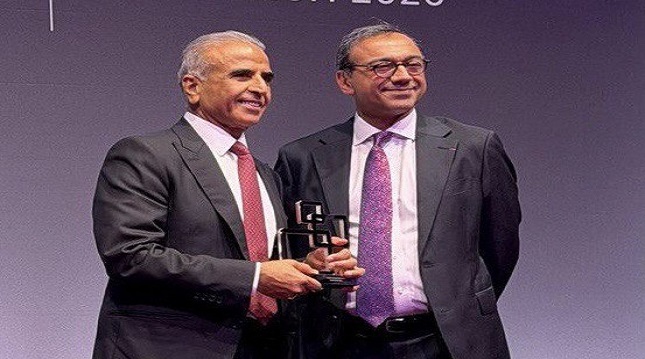Telecom
Nigeria Risks Internet Shutdown over IPv4
Unless urgent infrastructural and devices upgrades are carried out soonest, the country’s internet space may be shut down denying Nigerians access to the information superhighway because her Internet protocol (IP) is legacy.
In simple words, the internet protocol 4 (IPv4) on which most connectivity in Nigeria are channeled through is on the verge of extinction.
The Internet Protocol (IP), according to experts, is the principal communications modus operandi in the Internet protocol suite for relaying datagram across network circuits. Its routing function enables internetworking, and essentially establishes the Internet.
IP, as the primary protocol, Wikipedia writes, in the Internet layer of the Internet protocol suite, has the task of delivering packets from the source host to the destination host solely based on the IP addresses.
Engineer Otunte Otueneh, chapter officer, Internet Society Nigeria Chapter, told Nigeria CommunicationsWeek during that the IPv4 is almost finished, warning that, “by the time the IPv4 finishes most PC cannot be connected to the internet”.
Otueneh, who spoke at the sidelines of the IPV6 roundtable organised by DigitalSENSE Africa Media said that “we need to create awareness to tell Nigerians especially that version 4 is almost finished and we need to move on to the new version”
The exhaustion of the IPv4 pool and the inevitable transition to IPv6 has been the talk of many national and international meetings, particularly during a Sociétés de l’Information dedicated to the AfNOG, AfriNIC and INET meetings held in Abuja at the beginning of May 2007.
With IPv4 exhaustion looming and IPv6 taking a slow start, debate heated up at the conference.
According to Alain Patrick Aina, special project manager for AfriNIC, the company in-charge of internet protocol in Africa, stresses the total expiration could be extremely rapid, depending on the rates of consumption.
In Abuja, Bill Woodcock, Board member of ARIN, the North American Regional Internet Registry (RIR), warned that RIRs should get rid of old ways of thinking and start planning their next step.
AfriNic managing the end of IPv4eith less than 1% of the distributed IPv4 address space, AfriNIC is by far the smallest RIR. However, it has anticipated the end of IPv4 at an early stage.
It is foreseen that its current IP address space will run out in no distant time. Two last requests for further allocations to IANA, the global pool’s steward, should allow delaying IPv4’s regional exhaustion until April 2014.
Nevertheless, if IPv4 consumption rate accelerates critically before AfriNIC is able to justify its last request, there could be a major concern to ensure a smooth transition before IPV6 is fully implemented.
Otueneh continued, “It is unimaginable when the version 6 will finish. Now, we need to create awareness to tell Nigerians especially that version 4 is almost finished and we need to move on to the new version. Communication providers and end users have to be aware of this, if not they risk losing connectivity because the version they are using is on brick of extinction.
“Original Equipment manufacturers while manufacturing their equipment or devices they have to make sure that the technologies are IPv6 enabled. And the end user has to be wise enough that while you are going to shop you should request for IPv6 enables device. The problem will start when someone with internet protocol version 4 approaches an internet service provider that runs on IPv6, there will not be compatibility; at the end the user will lack connection to the internet”. He added
Nigeria CommunicationsWeek search further revealed that IPv6 and IPv4 are two completely separate protocols and IPv6 is not backwards compatible with IPv4.
IPv4 hosts and routers will not be able to deal directly with IPv6 traffic and vice versa, unfortunately, there will be extreme difficulties with address allocation and routing if the Internet is to continue be run indefinitely using IPv4 and it is impossible to switch the entire Internet over to IPv6 overnight.
Asked when IPv4 will be exhausted, Otueneh said that developed countries have started implementing IPv6, “but we are yet to do that in Nigeria. Meanwhile, we have a very minimal time. Very soon, AfriNIC may stop allocating version 4, because they told us that it is almost out. So, if there are a lot of demands for IP addresses today, it can get exhausted today”.
In his contribution, Benedict Othello, head, Information Systems, Phase 3 Telecoms, said that, “it is like being warned there is going to be flood, the question is: how do I get prepared so not to be affected or survive it”.
On the implication on mobile phone market in the country, he said, “before the danger loaming takes place, we are creating awareness. It is a two way thing. The service provider will be on version 6, the smartphones should be version 6 enabled. When that happens, they will flow seamlessly.
“Now, those on IPv4 platform cannot be accommodated by the service providers at a point. For instance if telecom operators in Nigeria roll out Sim cards and fail to expand their modules for more subscribers it will affect their businesses. It is all about upgrading to that new version to accommodate more customers”.
Otueneh said that some Original Equipment Manufacturers (OEMs) are already taking cover for the rainy days.
“Some of the laptops in circulation are already running on version 6. One can use the networking interface card to check the version of a particular device. OEMs have stated manufacturing internet protocol version 6 enabled equipments,” he observed.
He urged the government, especially the telecom regulators to compel service providers to brazen up for IPv6 migration.
“We need to proactive by training our technical personnel so that when the time comes, we will not lack qualified or competent people to handle that; if not we are creating room for expatriates to flood the IT environment which is indirectly creating channels for capital flight. But if we are ready now, at a time we shall be exporting the technical personnel, because it will take people by surprise,” he added.
Telecom
Konga Launches ‘Berekete Sales’ with Up to 50% Discounts Across Major Categories

Nigeria’s leading composite e-commerce platform, Konga, has announced the launch of its highly anticipated Berekete Sales, a nationwide promotional campaign designed to deliver exceptional value to customers across key product categories.

Konga Berekete
The initiative reinforces Konga’s commitment to affordability, accessibility, and innovation while strengthening its position as a trusted retail partner for millions of Nigerians.
The Berekete Sales campaign features discounts of up to 50% on high-demand categories including Home and Kitchen, Computing, Electronics, Beauty, and Personal Care.
Carefully curated to meet both everyday and aspirational needs, the campaign comes at a strategic period that coincides with Ramadan, Lent, and the approaching Eid al-Fitr celebrations, seasons traditionally associated with reflection, generosity, and family-oriented spending.
Speaking on the campaign, Victor Olaleye, Konga Group Head of Marketing, emphasised that the Berekete Sales initiative reflects the company’s understanding of the economic climate and the importance of value-driven retail experiences. “Berekete Sales is about delivering abundance in savings to our customers,” he stated.
“We recognise that this period is significant for many households observing Ramadan and Lent, and we want to ensure they can access premium products at competitive prices.
“Our goal remains to make quality products accessible while maintaining the seamless shopping experience Konga is known for.”
Among the standout offers is a special deal on the Starlink Gen 3 kit, now available at ₦550,000, reduced from its regular price of ₦590,000.
As the authorised distributor, Konga continues to provide customers with reliable access to the high-speed satellite internet solution, further strengthening connectivity options in Nigeria.
Activation services are available in select cities, ensuring a smooth transition to enhanced internet performance.
In addition, technology enthusiasts can take advantage of an exclusive offer on the Huawei Watch 3, with a special promotion that allows customers to receive two units for the price of one at ₦200,000.
This offer underscores Konga’s strategy of delivering premium lifestyle products with unmatched value.
The Berekete Sales campaign also extends to computing solutions, with attractive deals on ASUS laptops, catering to professionals, students, and businesses seeking performance-driven devices at competitive prices.
Furthermore, customers can pre-order the new Samsung Galaxy S26 Ultra on Konga and receive gift items worth over ₦500,000 from Samsung, a compelling incentive for early adopters and technology enthusiasts.
By aligning its promotional calendar with key religious seasons, Konga demonstrates cultural awareness while providing practical solutions for customers during Ramadan, Lenten observances, and Eid celebrations.
The campaign ensures that households can upgrade their living spaces, enhance productivity, and invest in quality lifestyle products without straining their budgets.
Beyond the discounts, Konga’s integrated ecosystem, spanning secure payment solutions, nationwide logistics, and reliable customer support, ensures a seamless shopping journey from browsing to delivery.
This operational strength continues to differentiate the brand within Nigeria’s competitive e-commerce landscape.
As consumer expectations evolve, Konga remains focused on delivering not just products but complete retail experiences anchored on trust, transparency, and value. The Berekete Sales campaign is positioned to drive significant traffic, boost sales volumes, and deepen brand loyalty across its growing customer base.
With substantial savings, premium product offerings, and time-sensitive deals, the Berekete Sales As the campaign gains momentum, customers are encouraged to visit Konga.com or any Konga retail store nationwide to take advantage of these limited-time offers.
With its blend of spiritual season sensitivity and high-tech accessibility, Konga continues to set the pace for the future of commerce in Africa.
Telecom
Sunil Bharti Mittal Conferred GSMA Lifetime Achievement Award for Transforming Global Telecommunications

The GSMA has conferred a rare Lifetime Achievement Award on Sunil Bharti Mittal, Founder and Chairman of Bharti Enterprises, recognising his role in reshaping the global telecommunications landscape and expanding connectivity across operators, governments, businesses and billions of consumers worldwide.

Bestowed on only a handful of industry leaders in the GSMA’s history, the honour recognises contributions that have left an enduring and defining mark on the global communications ecosystem.
The award was presented at Mobile World Congress in Barcelona in the distinguished presence of His Majesty Felipe VI, the Prime Minister of Spain, Pedro Sanchez, the President of Catalonia, Salvador Illa, and global industry leaders.
A visionary in the telecom sector, Sunil Bharti Mittal has built Bharti Airtel into one of the world’s leading mobile operators, with operations across India and Africa, ranking among the top three globally and serving over half a billion customers.
He pioneered the expansion of mobile services across emerging markets and served as Chairman of the GSMA from 2017 to 2018, where he championed policies that encouraged investment and innovation while strengthening the industry’s commitment to connecting the unconnected and advancing digital inclusion.
He was previously honoured with the GSMA Chairman’s Award in 2008 and again in 2016 for his outstanding contribution to the growth and development of the global mobile industry and was felicitated at Mobile World Congress in February 2019 in recognition of his Chairmanship.
On receiving the award, Sunil Bharti Mittal said, “I am deeply honoured to receive this recognition and sincerely thank the GSMA for this award. I accept it not only as a personal milestone, but as a tribute to India’s telecom journey, the collective spirit of Bharti, and the rise of Indian telecom companies on the global stage.
Equally the award reflects the progress of an industry that has connected billions and belongs to the customers we serve, the teams who built our institutions, and the partners who believe in the transformative power of connectivity.
Telecommunication is a force that expands opportunity, places essential services in the palm of every individual and unlocks human potential. Helping shape its evolution into a powerful accelerator of modern progress has been a privileged responsibility. As innovation accelerates, we will continue to work with our partners & stakeholders to ensure that growth advances equity and creates lasting opportunity for generations to come.”
The Lifetime Achievement Award is a rare honour, bestowed only on select individuals whose leadership and innovation have left an enduring mark on the industry.
Telecom
House Probes Fintech Regulation via Public Hearing on New Commission Bill

House of Representatives is pushing to regulate Nigeria’s fintech sector through a public hearing on “A Bill for an Act to Establish the Nigerian Fintech Regulatory Commission and for Related Matters (HB.2389).”

Speaker Tajudeen Abbas opened the hearing, stressing the need for stakeholder inputs to craft enforceable, constitutional laws addressing regulatory overlaps in digital banking, science, technology, and communications.
Abbas highlighted fintech’s role in Nigeria’s growth via digital payments, blockchain, crowdfunding, and financial inclusion for the unbanked, creating jobs and supporting SMEs under President Tinubu’s Renewed Hope Agenda.
He warned that lagging regulations cause fragmentation, compliance issues, and investor uncertainty, necessitating a coordinating commission for licensing, supervision, standards, and a level playing field without duplicating bodies like the Central Bank of Nigeria (CBN), SEC, NITDA, or NDIC.
The commission would protect consumers, monitor cybersecurity, ensure data privacy, and promote education while complementing existing regulators.
Committee Chairman Emmanuel Ukpong-Udo, overseeing digital banking, banking regulations, science, technology, communications, capital markets, and institutions, called the bill vital for harmonizing oversight amid Nigeria’s rise as Africa’s fintech hub with 430+ firms valued at billions.
Ukpong-Udo emphasized balancing innovation, stability, and coordination to avoid burdens on startups.
Bill sponsor Fuad Kayode Laguda argued the commission would streamline operations currently split among CBN, SEC, NITDA, NOTAP, and FIRS, boosting profitability, user security, and ease of business. He cited 2024-2026 stats: 250-430 firms, $230 billion market projection, $10.6 billion valuation for top nine, and $1.6 billion in mobile transactions.
Fintech stakeholders offered mixed views, with some backing unified regulation and others fearing overlaps with current mandates.

 E-Financial3 days ago
E-Financial3 days agoIran-Israel-US Conflict and CBN’s FX Gains: A Stress Test for Nigeria’s Monetary Stability

 E-Financial3 days ago
E-Financial3 days agoMutual Benefits Assurance Reaffirms Full Regulatory Compliance, Enhanced Governance

 General News3 days ago
General News3 days agoJAMB Uncovers AI-Driven Fraud Targeting UTME Candidates, Warns Parents

 Telecom2 days ago
Telecom2 days agoSunil Bharti Mittal Conferred GSMA Lifetime Achievement Award for Transforming Global Telecommunications

 General News3 days ago
General News3 days agoSERAP Asks FCCPC to Investigate Google, Meta, Others over Alleged Rights Abuses

 News3 days ago
News3 days agoTeamApt, Awabah Partner to Boost Pension Drive for Nigerians

 News3 days ago
News3 days agoFlashChange CEO, Bidemi Oke, Urges Startups to Build Strong Governance Structures Early

 Telecom2 days ago
Telecom2 days agoWhy Digital Trust Matters: Secure, Responsible AI for African SMEs?














